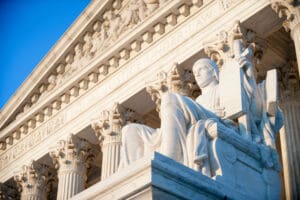The economic crisis caused by the coronavirus pandemic poses a triple challenge for tax policy in the United States. Lawmakers are tasked with crafting a policy response that will accelerate the economic recovery, reduce the mounting deficit, and protect the most vulnerable.
To assist lawmakers in navigating the challenge, and to help the American public understand the tax changes being proposed, the Tax Foundation’s Center for Federal Tax Policy modeled how 70 potential changes to the tax code would affect the U.S. economy, distribution of the tax burden, and federal revenue.
In tax policy there is an ever-present trade-off among how much revenue a tax will raise, who bears the burden of a tax, and what impact a tax will have on economic growth. Armed with the information in our new book, Options for Reforming America’s Tax Code 2.0, policymakers can debate the relative merits and trade-offs of each option to improve the tax code in a post-pandemic world.

Tax Policy Questions 2024 Presidential Candidates Should Address
Both candidates should provide clear and honest answers about their plans (or lack thereof) to address the nation’s urgent tax policy issues.
8 min read
Understanding Full Expensing in the United Kingdom
Given the positive contribution of full expensing to economic growth and that the UK already incurred the peak-year costs due to the existing policy, it is imperative to maintain it permanently.
5 min read
Supreme Court Rules against Moores 7-2, Leaves Most Questions Undecided
The government won in Moore. However, given the narrow opinion of the court and the reasoning in the Barrett concurrence and the Thomas dissent, it seems likely that future rulings under other facts and circumstances could favor taxpayers instead.
7 min read
The European Union’s ViDA Proposal: Ignoring Principles Does Not Make Tax Policy Fairer
Adopting tax policy based on sound principles like neutrality rather than political expediency is essential for the European Union’s fiscal future.
5 min read
How the TCJA Affected Legal Business Forms
The Tax Cuts and Jobs Act (TCJA) significantly lowered the effective tax rates on business income, but the impact was not the same for C corporations and pass-through businesses.
6 min read
Oregon Ballot Measure Would Yield Sky-High Business Tax Rates
The all-in Oregon state and local tax rate on large businesses could exceed 56 percent under a proposed ballot measure that purports to impose only a small tax increase on large businesses.
6 min read
TCJA Family Provisions Offer Template for Tax Reform in 2025
The Tax Cuts and Jobs Act’s changes to family tax policy serve as a reminder to avoid looking at tax reform provisions in a vacuum.
5 min read
Worldwide Investment at Risk as Capital Allowances Phase Out
Rather than adopt temporary policies that phase out and expire, policymakers should focus their efforts on long-term reforms to support investment.
6 min read
Conference on Tax Cuts and Jobs Act’s Effects Shows Further Tax Reforms Needed in 2025
Lawmakers should see 2025 as an opportunity to consider more fundamental tax reforms. While the TCJA addressed some of the deficiencies of the tax code, it by no means addressed them all.
8 min read
National Tax Literacy Poll: Understanding the Tax Code
To make sound financial decisions and support better tax policy, taxpayers should understand the taxes they face. Unfortunately, most U.S. taxpayers do not know or are unsure of basic tax concepts.
6 min read